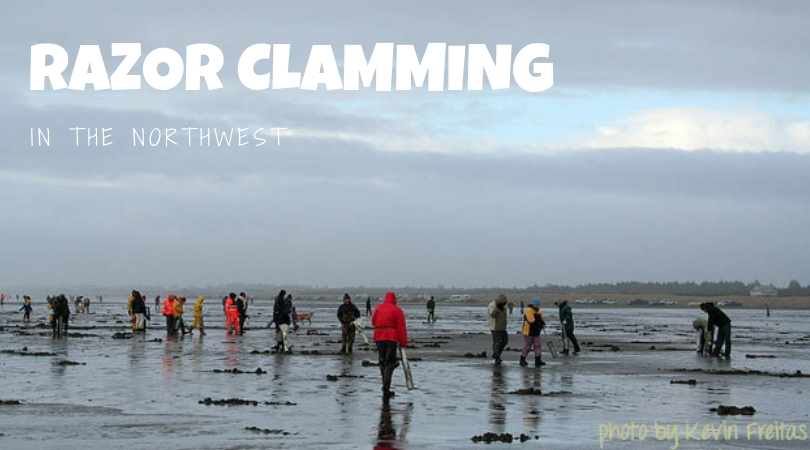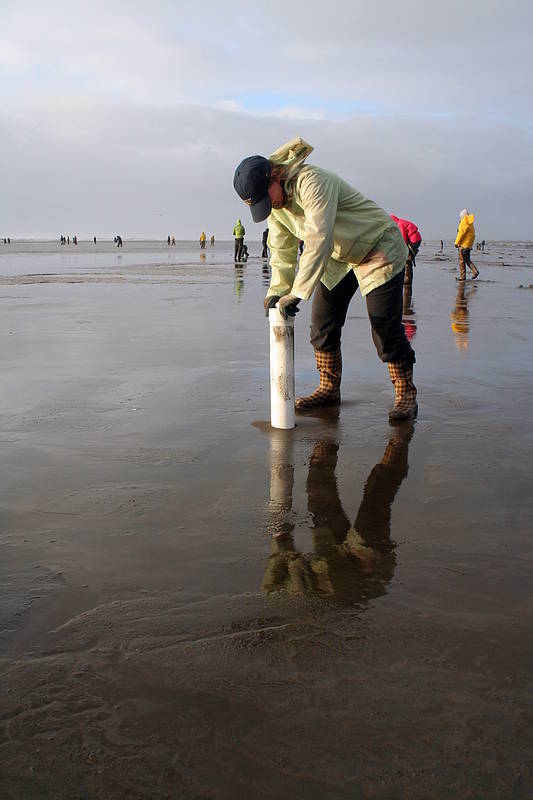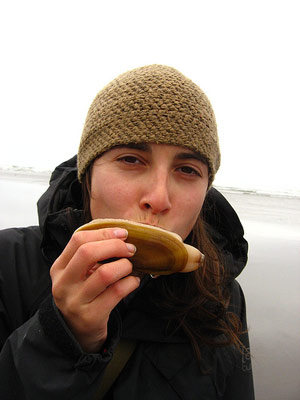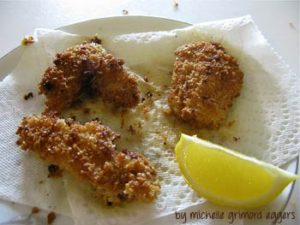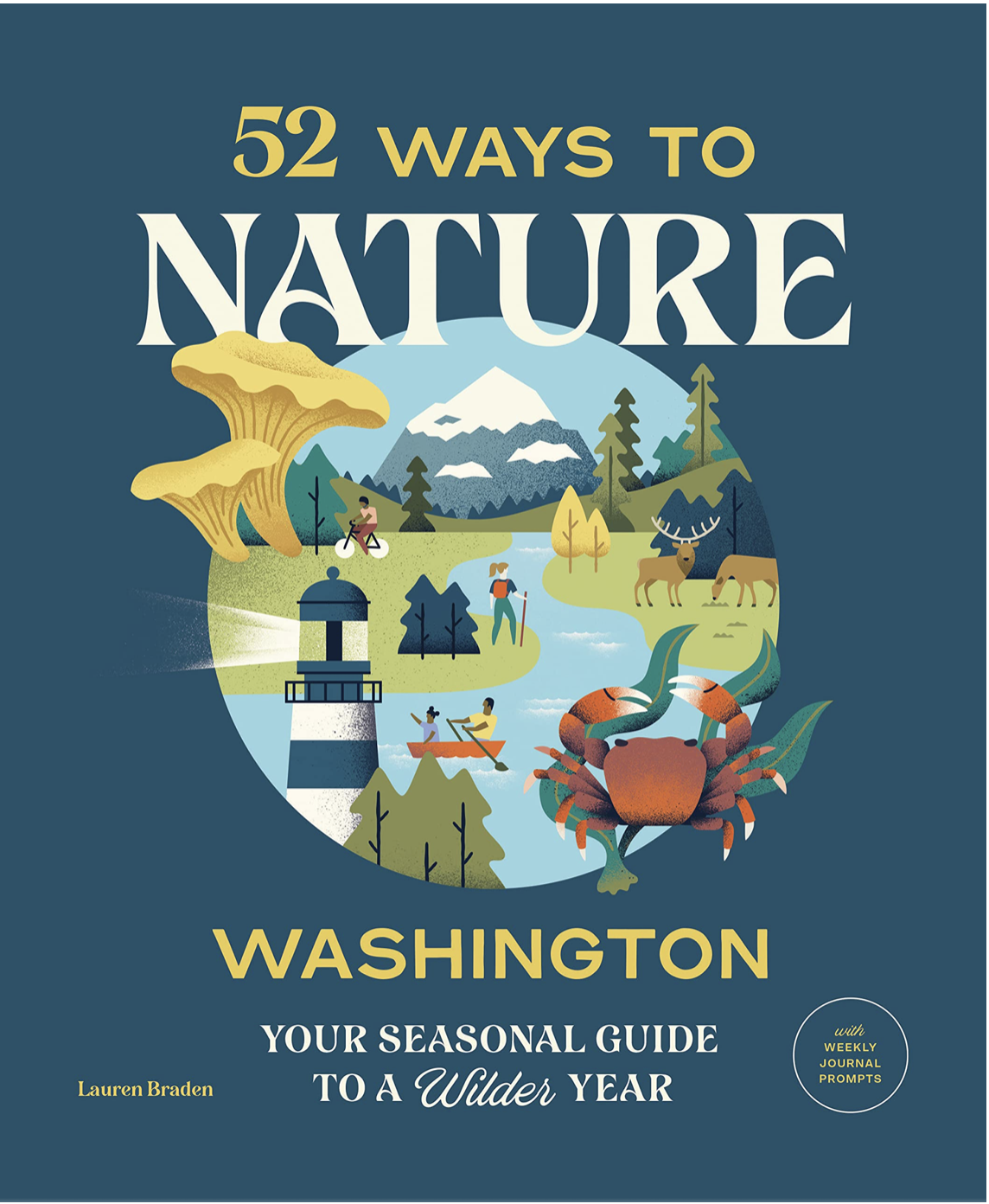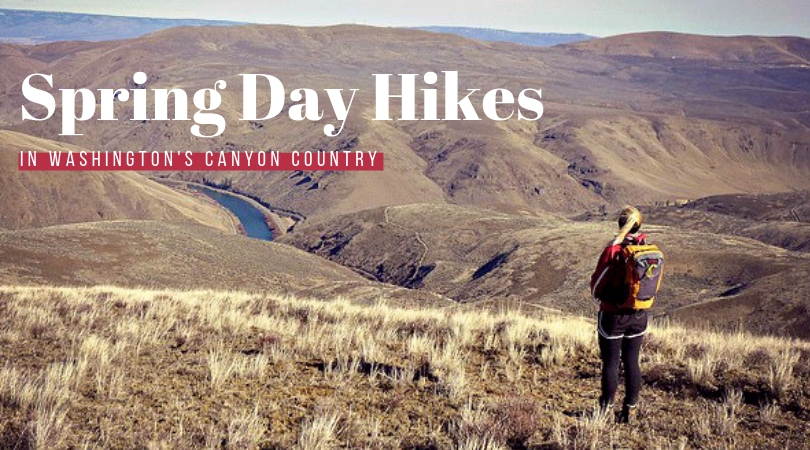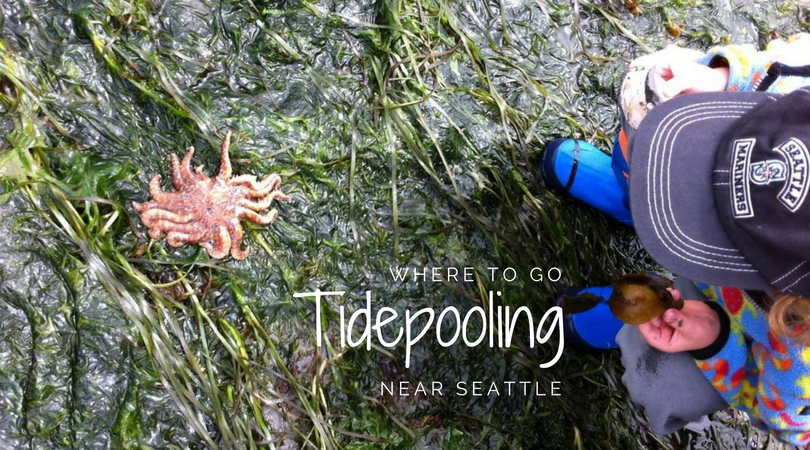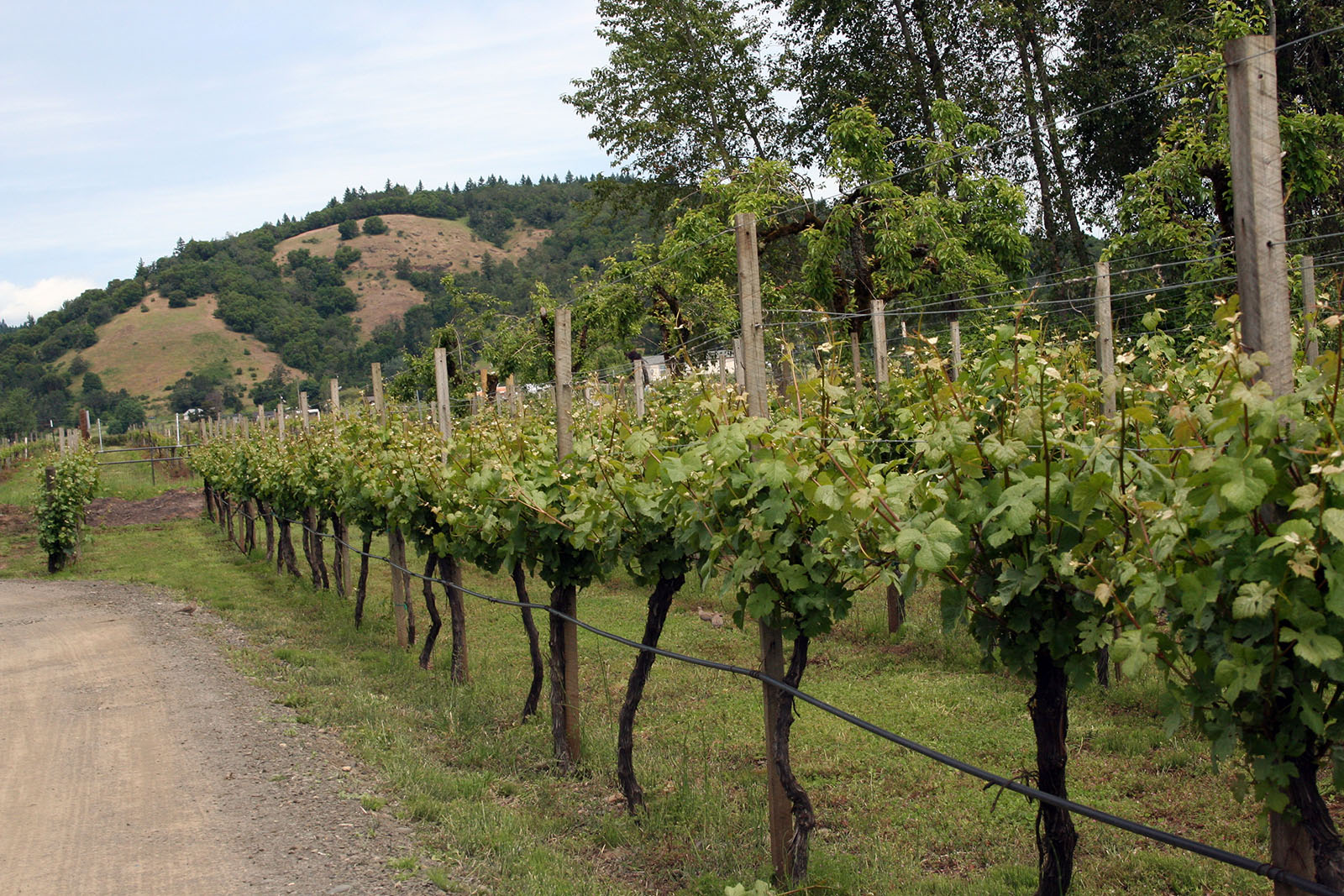Where to Dig for Clams
DIG DATES: Winter 2025 Washington Beaches
Below is the tentative schedule of proposed razor clam digs for Washington state beaches, along with evening low tides and beaches. Note: here’s the full schedule; dates are always subject to cancellation if testing shows marine toxins are high.
Razor Clamming Season is over for Winter 2024-2025. Check back for new ones in October.
![]() The North Beach (where to stay and eat near Mocrocks and Copalis beaches)
The North Beach (where to stay and eat near Mocrocks and Copalis beaches)
![]() Long Beach Peninsula (where to stay and eat on the Long Beach Peninsula)
Long Beach Peninsula (where to stay and eat on the Long Beach Peninsula)
_ _ __ _ _ _ _ _ _ _ _ _ _ _ _ _ _ _ _ _ _ _ _
What is a Razor Clam?
The meaty Pacific razor clam lives on inter-tidal coastal beaches. Out here, the tide sets the table. From October through April, many Pacific Northwesterners make a run for the coastal beaches to seek out razor clams, then go home and eat them all up.
Razor clamming is a popular recreational activity for all ages, and it’s easy to see why. It’s fun, it’s fulfilling to forage for and prepare your own found food, and razor clams are delicious!
Clamming is easy; all you need is a clam shovel or tube, a bucket to put your clams in (one bucket per person) and your clamming license. Kids will especially enjoy the task of finding the “clam shows,” or characteristic dimples or doughnuts in the sand that indicate a submerged razor clam.
_ _ _ _ _ _ _ _ _ _ _ _ _ _ _ _ _ _ _ _ _ _ _ _
“Why I Love Razor Clamming”
My friend and neighbor, Kelly Kirkland, went on a clam dig this past winter. I asked her about her life-long hobby of digging for clams:
Why is it so fun?
“Part of the fun is being cold and wet and sandy and miserable. In the way that hiking makes me drool at the thought of a simple PB&J, suffering to catch clams makes the chowder taste better.”
In Washington, everyone digs at the same time on designated weekends. What’s that like?
“The big beaches are crowded, but they’re also a great place to get tips from expert diggers.”
What’s the hardest part about razor clamming?
“Thank goodness for picture tutorials on the web on how to clean razor clams. I don’t remember how my mom did it but there is a science to it, especially if you want to be efficient.”
What are some of the ways you cook with your razor clams?
“On a recent trip we breaded and fried clam bits and dipped them in homemade tartar sauce back at our cabin, and kept the rest on ice to take home. We cleaned and froze them for use in clam chowder.”
_ _ _ _ _ _ _ _ _ _ _ _ _ _ _ _ _ _ _ _ _ _
State By State Rules and Regs
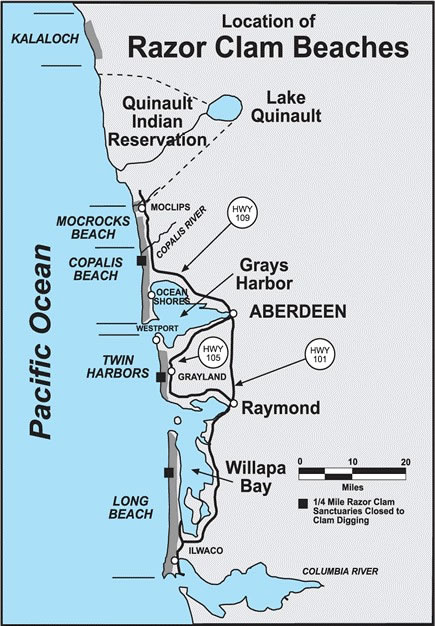
In Washington state, digging for these clams is regulated by the Washington Department of Fish and Wildlife to protect long-term populations, and permitted only on designated weekends, usually from October through April or May (see current weekends). WDFW approves these weekend digs after marine toxin tests confirm the clams are safe to eat.
In Oregon, razor clamming is regulated by the Oregon Department of Fish and Wildlife, but they do things quite differently. Beaches are open from the California border to Tillamook head year-round. Beaches from Tillamook head north to the South Jetty of the Columbia River experience a seasonal closure each year from July 15 -September 30. Beaches can be closed to all harvest in the event of a biotoxin closure, so always call the shellfish hotline at 1-800-448-2474 prior to harvest. Clatsop beaches (Columbia River to Seaside) have the most abundant populations–95% of Oregon’s razor clam digging occurs here.
In both states, it is illegal to discard any clam, broken shell or not, for whatever reason. Any clam that you catch counts towards your limit of 15 clams per day.
_ _ _ _ _ _ _ _ _ _ _ _ _ _ _ _ _ _ _ _ _ _
How To Find a Razor Clam
At low tide, scan the sand. Look for a “clam show.” These are characteristic dimples or doughnuts (a dimple with raised sides) in the sand that indicate there’s a submerged razor clam down below. These clam shows are formed when a clam has withdrawn its neck or started to dig, leaving a hole or dimple on the sand’s surface. Look for larger-sized holes, the size of a quarter. These larger dimples usually indicate the clam that’s beneath the surface is larger. Near the surf-line a razor clam might make its presence known is by squirting sand and water out of the hole above them.
How to Use the “Clam Gun” (aka “Clam Tube”)
Center the clam tube over the “clam show.” It’s best to face towards the ocean while you do this. Slant the top of your tube back just slightly towards your body. Next, work the tube into the sand carefully, using a twisting motion. Do this until the tube is about 6-10 inches below the sand’s surface. Place your thumb over air vent, bend your knees, then pull up on the handles. There – you’ve just brought up a core of sand. Is the clam in there? You have to check – the clam may be concealed within the sand. If the clam does not come up in the core of sand, reach into the hole for it. If you found a clam, you must keep it.
How to Use a Clamming Shovel
When you have located a clam show that interests you, insert the blade of the clam shovel into the sand vertically about 3 to 6 inches from the dimple or hole. You want the inside of the blade to face away from the show, which might seem counter-intuitive at first. A smaller shovel should be inserted closer to the show than a longer-blade shovel. Next, start removing sand with a lifting motion, twisting the shovel at the same time. Keep the blade as vertical as you can. Continue to slowly remove sand as you dig closer and closer to where you think the clam is. The point is to remove the sand next to the clam, eventually exposing it. Then, you can reach down and remove the clam by grasping the neck or shell. Note that the shovel should remain faced away from the clam, and use caution not to hit the clam with the shovel.
_ _ _ _ _ _ _ _ _ _ _ _ _ _ _ _ _ _ _ _ _ _
Razor Clamming Essentials
Clam License. You must have a current clamming license if you are age 15 or older. Fortunately, a Washington state shellfish license is easy to obtain. Licenses may be purchased online here, over the phone at (866) 246-9453, or in person at one of the hundreds of local vendors that sell them. You can get a 3-day Razor Clam license for $9.70, or an annual Razor Clam license for $14.10.
Clamming Tube or Shovel and a Bucket. A “Clam Gun” is a specialized tube for digging clams out of the sand, and are usually made of PVC or aluminum.
Another option is to use a specialized shovel for digging clams out of the sand known as a clamming shovel.
Whichever excavation aid you use, you’ll need a container to keep your razor clams in. Most clammers like to put their clams first in a mesh clam bag and place the bag in a bucket with a handle.
Rain Gear. Clamming season happens during winter on the Northwest coast. Rain gear is a must!
Dress in layers. Wear a waterproof and windproof jacket and pants (I love the Marmot Precip jacket and pants–they’re durable and very affordable) to protect yourself from wind and rain.
Known as “gumboots,” “wellies” or (as I like to call them) “Juneau Sneakers,” a sturdy pair of rain boots are essential for any clam dig in the Pacific Northwest. They range from a tad ugly to super-cute, so choose a pair that suits your style and budget.
_ _ _ _ _ _ _ _ _ _ _ _ _ _ _ _ _ _ _ _ _ _
Razor Clam Recipes
So, you have your bucket of fifteen razor clams. What’s next?
First you’ll need to clean them. This process can be intimidating for a first-timer, so consult a step-by-step guide like this one with photos from Sunset Magazine.
Once you’ve got trimmed, clean clams, whip up any of these delicious recipes and set the table!
Pacific Fried Razor Clams {The Depot in Seaview} Locals like to coat their clams with crackers and fry them. Chef Michael Lalewicz prefers Ritz crackers for a more buttery and salty finish.
Razor Clam Linguine {edibleSEATTLE} Toss some pasta in a pan with clams, oregano, parsley, and red pepper.
Panko-fried Razor Clams {Alaska from Scratch} Razors become very chewy if overcooked, but this recipe produces a perfect crunchy coating while leaving the clams tender and juicy. A sprinkle of sea salt, a squeeze of lemon, and could someone please pass the homemade tartar sauce?
Steelhead Diner Razor Clam Chowder {Steelhead Diner} Apple-smoked bacon and juicy razor clams come together for a delicious, hearty chowder.

